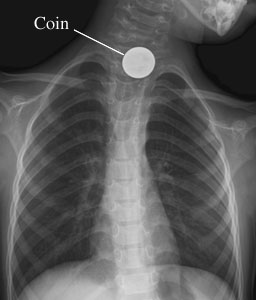Jump to
Chest X-Ray of a Swallowed Object

Courtesy of Intermountain Medical Imaging, Boise, Idaho. All rights reserved.
Front view of a child's chest X-ray shows a swallowed coin.
How can you care for your child who has an object in the throat or esophagus?
- Be safe with medicines. Read and follow all instructions on the label.
- If your child is not taking a prescription pain medicine, ask your doctor if your child can take an over-the-counter medicine.
- If the doctor gave your child a prescription medicine for pain, give it as prescribed.
- Store your child's prescription pain medicines where no one else can get to them. When you are done using them, dispose of them quickly and safely. Your local pharmacy or hospital may have a drop-off site.
- If the doctor prescribed antibiotics for your child, give them as directed. Do not stop using them just because your child feels better. Your child needs to take the full course of antibiotics.
- Give your child liquids to drink. If swallowing liquids is easy for your child, then try soft foods like bread or bananas. If these foods are easy to swallow, start to add other foods.
- If your child swallowed an object and it has passed through to the stomach, try giving your child foods that are high in fiber, such as fruits, vegetables, and whole grains. These foods may help your child pass the object more quickly.
- Watch your child's stools to see if the object has passed. Do not give your child a laxative unless your doctor says that it is okay.
- Keep your child away from smoke. Do not smoke or let anyone else smoke around your child or in your house. Being around smoke can irritate your child's throat and esophagus even more.
To prevent swallowing objects or choking:
- Cut food into small pieces.
- Do not give popcorn, nuts, or hard candy to children younger than 4, and supervise older children when they eat these foods.
- Encourage your child to eat slowly, take small bites, and chew food all the way.
- Discourage laughing or talking with the mouth full.
- Warn your child not to eat or drink while doing something else, such as running or playing.
- Do not let your child hold objects, such as pins, nails, or toothpicks, in the mouth or between the lips.
- Do not give younger children small objects that may cause choking, such as disc batteries, coins, or marbles.
- Look for age guidelines when selecting toys for children:
- Do not let your child play with a toy if your child is younger than the recommended age for the toy.
- The safest toys for small children are at least 1.25 inches around or 2.25 inches in length.
Object in a child's throat or esophagus: When to call
Call 911 anytime you think your child may need emergency care. For example, call if:
- Your child passes out (loses consciousness).
- Your child has chest pain.
- Your child vomits a large amount of blood or what looks like coffee grounds.
- Your child has severe stomach pain.
- Your child passes maroon or very bloody stools.
- Your child cannot swallow, even their own saliva.
- Your child has severe trouble breathing.
Call your doctor now or seek immediate medical care if:
- Your child has any stomach pain.
- Your child has signs of an infection, such as:
- Pain, swelling, or tenderness in or around the throat, neck, chest, or belly.
- A fever.
- A cough.
- Shortness of breath.
- Your child vomits a small amount of blood or what looks like coffee grounds.
- Your child has mild trouble breathing.
- Your child has mild trouble swallowing.
- Your child vomited more than one time since the object was removed from the throat or esophagus or since the object was swallowed.
- Your child's stools are black and tarlike or have streaks of blood.
Watch closely for changes in your child's health, and be sure to contact your doctor if:
- Your child still feels like there is something stuck in the throat or esophagus.
- Your child does not get better as expected.
©2011-2025 Healthwise, Incorporated
The content above contains general health information provided by Healthwise, Incorporated, and reviewed by its medical experts. This content should not replace the advice of your healthcare provider. Not all treatments or services described are offered as services by us. For recommended treatments, please consult your healthcare provider.
